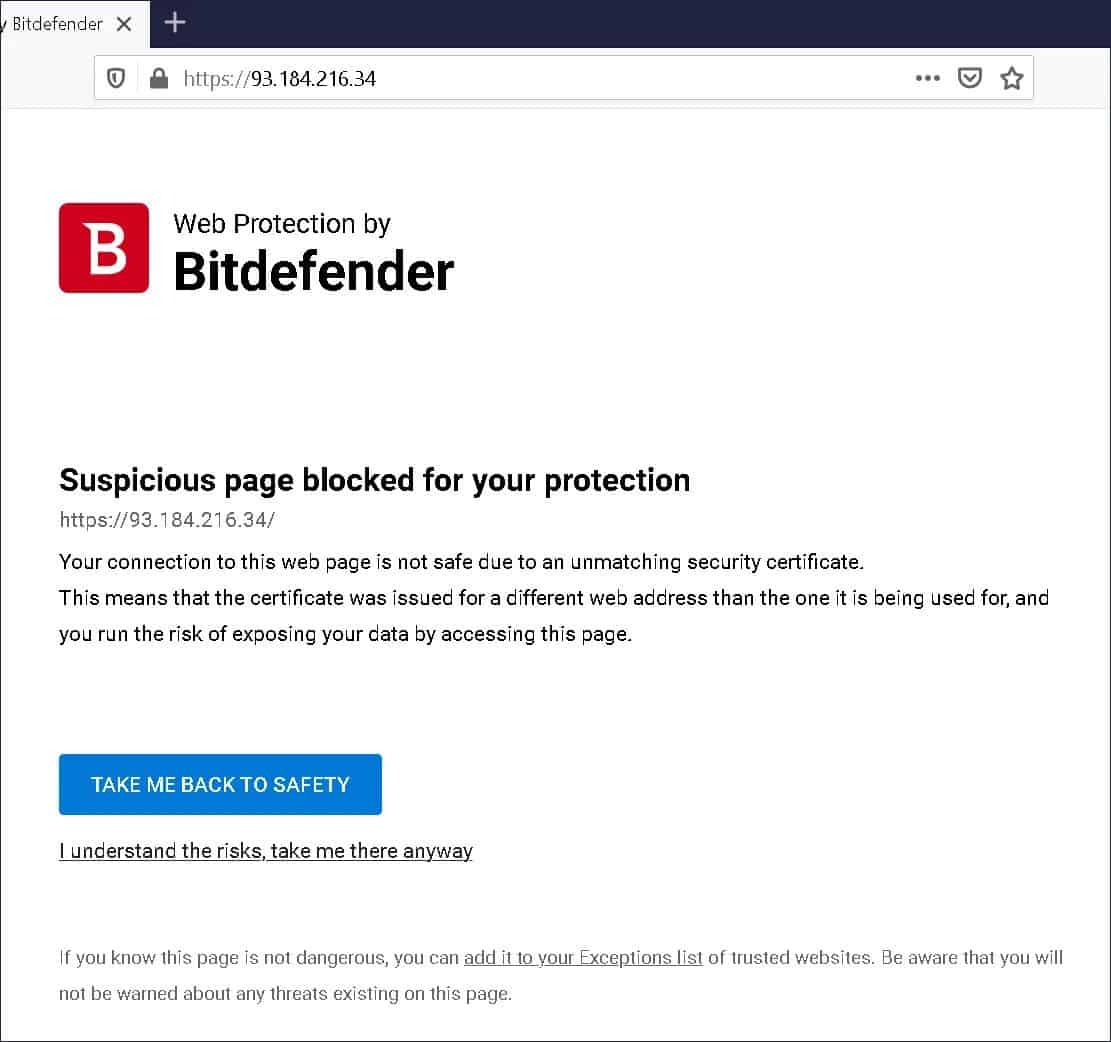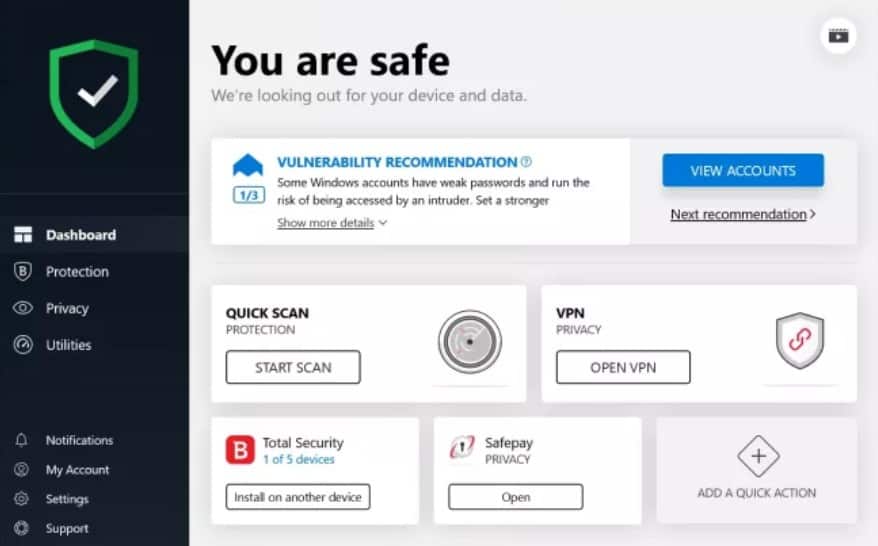Which antivirus should make it onto your shortlist: Webroot or Bitdefender?
Bitdefender has a solid reputation in the antivirus industry and its products are used in 38 percent of global cybersecurity solutions. While Webroot may not have the same industry prestige, it does claim rapid scanning times as a lightweight security solution.
This review will comprehensively test each antivirus suite’s main features, effectiveness against malware, system performance, and interface design. We will also cover prices, discounts, and customer service to provide a full overview of each tool.
Want the short version? Who wins between Bitdefender and Webroot?
Bitdefender is my top choice. I found this service was the most effective antivirus and the best all-round security solution when compared with Webroot. Bitdefender’s Premium Security package offers a fuller feature list, impressive virus detection scores, and excellent protection against malware.
Here is what I found when I put Bitdefender up against Webroot:
Summary: Bitdefender vs Webroot
Bitdefender
- Unlimited encrypted VPN
- Powerful and quick deep scan software
- Multi-layer ransomware protection
Webroot
- LastPass password protection
- 25GB of encrypted automatic backup
- Lightweight software in terms of disk space scan impact
| Feature | Bitdefender Premium Security | Webroot Complete Security |
|---|---|---|
| Antivirus and antispyware | ✔ | ✔ |
| Firewall | ✔ | ✔ |
| Webcam protection | ✔ (Also includes microphone protection) | ✔ |
| Password manager | ✔ | ✔ |
| Anti-phishing | ✔ | ✔ |
| Ransomware protection | ✔ | ✔ |
| Banking and payment protection | ✔ | ✖ |
| Parental control | ✔ | ✖ |
| Network attack protection | ✔ | ✖ |
| Encrypted storage | ✔ | ✔ |
| Automatically update apps | ✔ | ✖ |
| VPN | ✔ | ✖ |
| File shredder | ✔ | ✖ |
| Performance optimization | ✔ | ✖ |
| Identity theft protection | ✔ | ✔ |
| File backup | ✔ | ✔ |
Background
Webroot is a US-based private internet security company founded in 1997. It claims to be the first company to utilize cloud technology and Artificial Intelligence (AI) in the pursuit of security against zero-day threats in real-time.
Bitdefender protects over 500 million systems in 150 global regions. It was founded in 2001 in Romania and has grown to over 1,600 employees. The company website claims that over half of its workforce specializes in the research and engineering of new cybersecurity solutions.
Pricing
| Software | Price |
|---|---|
| Bitdefender Antivirus Free | Free |
| Bitdefender Internet Security - 3 Devices | $79.99 per year |
| Bitdefender Premium Security - 10 Devices | $89.99 per year |
| Webroot SecureAnywhere AntiVirus | $39.99 per year |
| Webroot SecureAnywhere Internet Security | $59.99 per year |
| Webroot SecureAnywhere Internet Security Complete | $79.99 per year |
Bitdefender
Bitdefender Antivirus Free Protection is available on Windows devices only. The free program offers anti-phishing tools, advanced threat defense systems, real-time data protection, and Bitdefender Photon, the company’s performance optimization tool.
Bitdefender Internet Security protects up to three devices for $79.99. This package offers all of the tools available in the previous tier, alongside a few others. For the first year, the suite is discounted to $39.98 and you can alter your membership to cover between one and 10 devices.
Bitdefender Total Security costs $89.99, discounted to $44.99 for the first year. This subscription can be altered to cover five or 10 devices.
Bitdefender Premium Security is the company’s highest-priced antivirus solution. The standard subscription costs $149.99 per year but is available for a discounted rate of $89.99 in the first year.
Webroot
Webroot’s SecureAnywhere Antivirus costs $39.99 and covers a single device. This package can provide PC or Mac protection, ID security, real-time anti-phishing and a network protection firewall tool. Webroot offers a $10 discount on the first year subscription bringing the price down to $29.99.
SecureAnywhere Internet Security includes all of the tools provided by the previous tier, plus smartphone protection and password protection. This suite will protect up to three devices for $59.99. There’s a $15 discount on the first year subscription, bringing the price down to $49.99.
SecureAnywhere Internet Security Complete adds 25GB of online storage and the ability to anonymize your internet history through various tools. It costs $79.99 for a year and covers up to five devices. There’s a $20 discount in the first year, bringing the price down to $59.99.
Effectiveness against malware
To see how each program performs against malware I tested how well they detect and block sample virus files from the European Institute for Computer Antivirus Research (EICAR).
EICAR files simulate infections similar to real-life scenarios, so I can test how AV software deals with these potential threats.
The table below shows how the two suites performed against the EICAR files.
| Test File | Eicar Sample 1 | Eicar Sample 2 | Eicar Sample 3 | Eicar Sample 4 |
|---|---|---|---|---|
| Bitdefender | Blocked | Blocked | Blocked | Blocked |
| Webroot | Allowed | Allowed | Allowed | Allowed |
Bitdefender easily outperformed Webroot during the tests with the four simulation files. While it should be noted that the files were not detected by Bitdefender’s quick scan, it did detect and block all the sample files in real-time scanning mode.
Webroot allowed all of the EICAR files, even after they were unzipped. This is obviously not what we want to see from an antivirus program.
The next test to assess the threat protection capabilities of the suites uses three live malware samples. The programs were put up against an adware sample and two different strains of trojan horse programs.
Adware infects a system with hundreds of potentially dangerous popup ads. These can generate passive revenue from your system for the hacker, and may lead to malicious websites upon clicking. Trojan horses operate by hiding inside a seemingly legitimate program, opening up your PC to threats like data mining, identity theft, or ransomware attacks.
Ideally, we would see a good consumer-grade antivirus software successfully detect and block each of these files.
| Test File | Live Sample 1 (Adware) | Live Sample 2 (Trojan) | Live Sample 3 (Trojan) |
|---|---|---|---|
| Bitdefender | Blocked | Blocked | Blocked |
| Webroot | Blocked | Blocked | Blocked |
Both Bitdefender and Webroot were successful in these tests. The two suites detected and blocked each sample in real-time. It again should be noted that these files were not detected by Bitdefender’s quick scan.
The next table shows how fast the program’s full scan resolves and how many items it scans in that time. A larger number here indicates how deep within a machine it actually checks for malware threats.
| Test Type | Full Scan Time (minutes) | Full Scan # Items Scanned |
|---|---|---|
| Bitdefender | 110 | 4200000 |
| Webroot | 72 | 11938 |
Bitdefender’s scan checks over four million different items. In comparison, Webroot covers 11,938 items. Despite this huge difference in depth, Bitdefender’s scan only takes 35 minutes longer to complete.
It is also worth mentioning that I checked an industry-leading antivirus-testing website, AV-Comparatives. This site has no recent data for Webroot; the most up-to-date test the site has is from 2012. However, Bitdefender ranks incredibly high in both the real world and malware removal tests.
Bitdefender scored a 99.3 percent protection ranking in the most recent Real-World Protection Test, placing it in the upper cluster of the programs AV-Comparatives tested. In the 2018 Malware Removal test, it scored highly again, coming in at 94/100, ranking far above the industry standard.
Impact on PC performance
In the table below, we see the impact each program had on PC performance during a full scan.
| Test Type | Control CPU Utilization % (no scan) | Control Memory Utilization % (no scan) | Full Scan CPU Utilization % | Full Scan Memory Utilization % | Full Scan Time (minutes) |
|---|---|---|---|---|---|
| Bitdefender | 32 | 74 | 56 | 81 | 110 |
| Webroot | 25 | 67 | 95 | 63 | 72 |
Bitdefender has a lower impact on CPU utilization, showing a 24 percent increase on the control number, as opposed to the 70 percent increase observed for Webroot. On the other hand, the memory usage impact was so negligible under Webroot that there was actually a dip in that value from the control number. This compares with a seven percent increase seen with Bitdefender.
A quick scan differs from the full scan in that it only checks for malware in the most common areas of a device. As such, it’s a quicker and shallower form of scan. The performance data for each quick scan is shown in the table below.
| Test Type | Control CPU Utilization % (no scan) | Control Memory Utilization % (no scan) | Quick Scan CPU Utilization % | Quick Scan Memory Utilization % | Quick Scan Time (seconds) |
|---|---|---|---|---|---|
| Bitdefender | 32 | 74 | 56 | 81 | 338 |
| Webroot | 25 | 67 | 31 | 78 | 1 |
A different trend can be observed in the quick scans. Webroot shows a larger tax on memory utilization (11 percent compared to Bitdefender’s seven percent). Webroot has less impact on CPU usage with a six percent impact compared to Bitdefender’s 24 percent.
Another interesting point to consider here is the huge difference in time for the two quick scans.
Webroot’s quick scan only takes one second to resolve, fulfilling the promise on the company’s website of lightning-fast software. In comparison, Bitdefender’s scan takes 338 seconds to complete.
To add to my own tests, I looked at AV-Comparatives’ performance tests from April 2020. The test measures PC performance with the antivirus software installed. To evaluate this, it records the speed of eight common tasks:
- Downloading files
- Browsing websites
- File copying: first and subsequent run
- Installing and uninstalling applications
- Archiving and unarchiving
- Launching applications: first and subsequent run
Bitdefender almost scored perfect marks. It received a very fast rating for all tasks, with the exception of file copying on the first run where it was still rated as fast. Webroot was not included in the April 2020 performance test by AV-Comparatives, so I can’t compare the results from this test. My own tests would indicate that Webroot has no issue with speed.
Features
To find which antivirus software offers the best additional security features, I checked out the tools on offer from each provider.
I’ve listed the main features below and included a brief description of the standout features.
Bitdefender Premium Security
- Behavioral monitoring of active apps in real-time
- Bitdefender safe files
- Password manager
- Webcam and microphone protection
- File shredder
- Anti-tracker software
- Multi-device compatibility
- Multi-device encrypted VPN
- Performance optimization
- Unique protected browser for banking
Webroot SecureAnywhere Internet Security Complete
- Identity theft protection
- Quicker scans than competitors
- Password manager
- Mobile security
- Performance optimizer
- Automatic encrypted storage
- Anti-phishing in real-time
- Webcam protection
Bitdefender
Ransomware Protection – Bitdefender includes defenses against ransomware and provides a layer of protection for your photos, videos, and documents.
Unlimited VPN – The Premium VPN service encrypts internet traffic protecting you while browsing, streaming, and downloading.
Anti-theft – Should your Windows laptop be lost or stolen, you can remotely access the device from anywhere in the world with your Bitdefender account.
Webroot
Secure cloud storage – With 25GB of space in the cloud, users can store music, files, and photos, freeing up hard drive space.
LastPass – A secure password management tool that stores details including passwords, usernames, and credit card information.
Fast scans – Webroot’s scans are up to 60 times faster than other leading antivirus programs.
Both providers offer some great additional features. Bitdefender’s VPN enhances privacy, while the anti-theft and ransomware tools protect against potential dangers.
Webroot’s cloud storage is useful, but the extra features that come with Bitdefender offer the best value for most users.
Signup and installation
Bitdefender’s payment page is only two clicks away from the homepage, making the signup process really simple. It took only two minutes to sign up for an account and download the software on my machine, with fairly average internet speed.
Unsurprisingly, Webroot’s software was exceptionally quick to download. It took about half the time of Bitdefender’s and had an even quicker install time. The checkout page is just one click away from the homepage.
How easy is the interface to use?
Both Webroot and Bitdefender make some similar choices in terms of color scheme for the interfaces. Both use green, black, gray, and white.
Bitdefender’s interface is a bit cleaner, with a black sidebar that separates each section, and text on a white background.
Overall, I find Bitdefender’s interface easier on the eye than the more crowded display on the Webroot user interface.
Customer support
Bitdefender’s support can be found using the dropdown menu on the website, with the page only two clicks away.
It offers a full range of contact options, which include phone lines, email, a live chat service, and access to Bitdefender’s user forums. It also provides a set of FAQs, alongside videos to cover similar topics.
Webroot’s support is accessible through a dropdown on the homepage. The support page offers account management, ticket submission for support issues, and access to the company’s knowledge base. There is also a support phone line and access to the extensive social media networks established by the company.
Conclusion
From this review, I have found that Bitdefender comes out on top. The company’s Premium Security package outperforms the equivalent offering from Webroot quite considerably, especially in the tests I ran against the two programs.
Independent antivirus testing labs also rank Bitdefender very highly, and it outperforms Webroot in the depth of its scans.
When all of these factors are considered, it becomes clear that Bitdefender provides a more useful antivirus solution for consumers.
See also:




